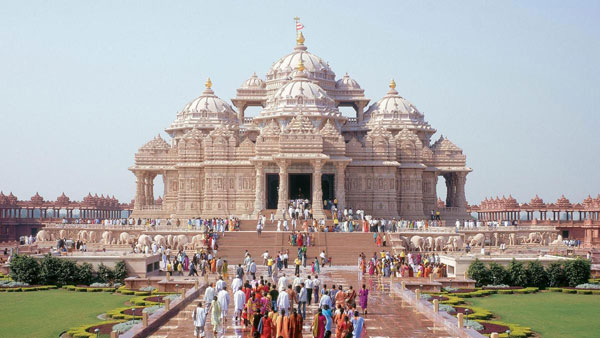The BAPS Hindu Mandir project is one that is unlike any other undertaken in the region. Balancing the traditions of an ancient architectural style with modern facilities, construction methods and requirements provides unique challenges. RSP, the lead designers of the project and Ramboll, the lead engineering consultants have been approaching each challenge as an opportunity and have worked together to design an award-winning complex.
The BAPS Shri Swaminarayan Mandir of Abu Dhabi, UAE is a traditional Hindu place of worship that is being built by the BAPS Swaminarayan Sanstha. The site is located at Abu Mureikhah, which is near Al Rahba off the Dubai–Abu Dhabi Sheikh Zayed Highway. The mandir, upon completion, will be the first traditional Hindu stone mandir in the Middle East. The BAPS Swaminarayan Sanstha, which is headed by Mahant Swami Maharaj, is a denomination of the Swaminarayan branch of Hinduism. The mandir, inspired by Pramukh Swami Maharaj and blessed by Mahant Swami Maharaj, will be situated on 55,000 square meters of land.
The mandir will be hand-carved by artisans in India and assembled in the UAE. The mandir will incorporate all aspects and features of a traditional Hindu mandir as part of a fully functional, social, cultural and spiritual complex.
An insight on the development Construction details of BAPS Hindu Mandir’s Foundation
In August 2015, the UAE government announced the decision to provide land for building a Hindu mandir in Abu Dhabi, during Indian Prime Minister Narendra Modi’s first official visit to the country. Sheikh Mohammed bin Zayed Al Nahyan, the Crown Prince of Abu Dhabi and Deputy Supreme Commander of the UAE Armed Force gifted the land for the mandir.
On 10 February 2018, BAPS representatives met Sheikh Mohamed and the Indian Prime Minister in the Presidential Palace. A memorandum of understanding was signed by India and the UAE in the presence of the entire royal family and over 250 local leaders. The Shila Pujan (foundation stone laying ceremony) for the mandir took place on 11 February 2018. The Shila Pujan marked the first vedic step in the mandir’s construction. Prime Minister Narendra Modi witnessed the ceremony via live stream from the Dubai Opera House. For the construction, tonnes of pink sandstone will be shipped from northern Rajasthan to Abu Dhabi. The durable stones from the northern Indian state were selected for their ability to withstand scorching summer temperatures of up to 50 °C (122 °F), such as those sometimes experienced in the UAE. Marble from Europe may also be used to build the mandir.
On 20 April 2019, the foundation stone-laying ceremony of the first traditional Hindu mandir in Abu Dhabi has been performed this morning in the presence of thousands of Indian community people and officials from India and the UAE. The ceremony was being administered as per vedic rituals in the presence of Mahant Swami Maharaj, the spiritual leader of Bochasanwasi Akshar Purushottam Sanstha (BAPS) Swaminarayan Sanstha.
The 13th annual MEP Middle East Awards were hosted in Dubai in 2019 with leading consultants, contractors and suppliers in the running for awards in 20 separate categories. BAPS Hindu Mandir Abu Dhabi’s engineering consultants Ramboll were also contending with a unique submission – the mechanical engineering of the BAPS Hindu Mandir project.
After in-depth review by industry experts, the BAPS Hindu Mandir was awarded the ‘Mechanical Project of the Year 2019’. Past awardees include the Dubai Opera House, Khalifa University and the Dubai Trade Center District. The design benefited from energy-efficient systems with energy and enthalpy recovery, careful selection and discreet placement of plant and distribution equipment to promote the experience of being in a spiritual centre, and consideration given to providing an extremely low impact in terms of acoustic performance within the temple areas, such as the prayer hall and Abhishek mandap.
The BAPS Hindu Mandir project is one that is unlike any other undertaken in the region. Balancing the traditions of an ancient architectural style with modern facilities, construction methods and requirements provides unique challenges. RSP, the lead designers of the project and Ramboll, the lead engineering consultants have been approaching each challenge as an opportunity and have worked together to design an award-winning complex.
BAPS Hindu Mandir’s Foundation Commenced, Abu Dhabi, UAE
The BAPS Hindu Mandir, Abu Dhabi, witnessed a major construction milestone with the concrete pouring ceremony for its raft foundation in february.
Brahmavihari Swami and Akshaymuni Swami led the special prayers for the project during a ceremony to mark this auspicious occasion in the presence of His Excellency Pavan Kapoor, the Indian Ambassador to the UAE and His Excellency Shri Vipul, The Consul General of India to Dubai, Dr. Omar Al-Muthanna, CEO of the Community Development Authority and Mohandass Saini, CEO of Shapoorji Pallonji & Co. Ltd., and other distinguished guests.
During the ceremony, Brahmavihari Swami gave a detailed report of the progress of the Mandir’s construction, “We have been generously gifted the land by the Crown Prince of Abu Dhabi and continually encouraged by our Prime Minister Narendra Modi. Our spiritual head, Mahant Swami Maharaj, performed the Shilanyas Vidhi on 20 April 2019. Today, we are embarking upon the unique Mandir raft which is built using a combination of ancient technology and modern instrumentation. This could not have been possible without the grace of God, the complete support of the community and the love of everyone present here today.”
H.E. Pavan Kapoor, the Indian ambassador to the UAE, addressed the gathering, “I have to give credit to my predecessor who supported this initiative and, most of all, to the UAE government for taking this enormous and very generous decision not just to donate the land, but to give the first license to the temple.” He added, “Till the temple is completed, BAPS has my full and complete support.”
Dr. Omar Al-Muthanna, Chief Executive Officer at the Community Development Authority, also addressed the assembly, stating, “We want this country to not just be a residency, we want you to feel at home. It is always positive to inject our community with religious individuals irrespective of their religion and this is our commitment to you. We wanted to be sure that we have selected the right partner; today is an excellent example that we have selected the right partner – BAPS. The BAPS Hindu Mandir came to us years ago with a dream and day by day this dream is becoming a reality.”
Attendees were then ushered to the construction site, where the prayers were offered prior to the first layer of fly-ash concrete mix being poured into the foundation. The ceremony marked a single pour of 3,000 cubic meters of concrete mix consisting of 55% fly ash, making the Mandir foundation environmentally friendly. This unique mix contains no steel reinforcements, following the ancient architectural tradition for religious stone buildings in India. This occasion marked the first and largest such concrete pour in the UAE. Moreover, more than 300 hi-tech sensors have been embedded at 10 different levels to provide online active data of stress, pressure, temperature and seismic events for the next 50 years. Professor Kishida Tadahiro of Khalifa University, who was also present, along with Snehal Patel, a foundation engineer of BAPS Canada, are planning to guide students to conduct research on the data collected by the sensors.
Once the raft foundation solidifies, the rest of the foundation features will be completed in different stages. The stone work for the Mandir will be sculpted by highly skilled artisans in India and then shipped to the UAE to be assembled on the site like a complex jigsaw puzzle. Then the temple will slowly start to take form, layer by layer. Having begun at 6:00 p.m. on 13 February, the concrete pour was completed 20 hours later at 2:00 p.m. on 14 February 2020.
Abu Dhabi’s first Hindu temple boasts a cultural and spiritual centre with six to seven prayer rooms, play areas for children, lush gardens, vegetarian food courts, a library, gift store, exhibition halls, a visitor’s centre and more.
Info source- baps.org






